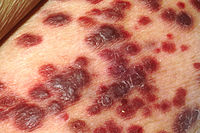
Photo from wikipedia
The prevalence of oncogenic rat sarcoma virus (RAS) mutations has made RAS a popular target for cancer therapies. Significant discoveries have been reported regarding cancer molecular biology following the study… Click to show full abstract
The prevalence of oncogenic rat sarcoma virus (RAS) mutations has made RAS a popular target for cancer therapies. Significant discoveries have been reported regarding cancer molecular biology following the study of RAS mutations. These discoveries are integral in shaping the era of targeted cancer therapy, with direct targeting of RAS or downstream RAS effectors, such as Grb2 and MAPK a possibility. Novel agents such as farnesyltransferase directly bind and sequester RAS. While these new agents and approaches have shown promise in preclinical and clinical studies, the complexity of RAS signaling and the potential for robust adaptive feedback continue to present substantial challenges. Therefore, the development of targeted therapies will require a detailed understanding of the properties and dependencies of specific cancers to a RAS mutation. This review provides an overview of RAS mutations and their relationship with cancer and discusses their potential as therapeutic targets.
Journal Title: Future Science OA
Year Published: 2020
Link to full text (if available)
Share on Social Media: Sign Up to like & get
recommendations!